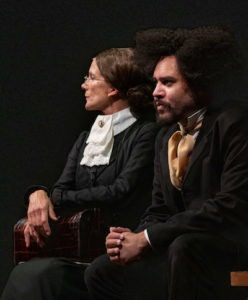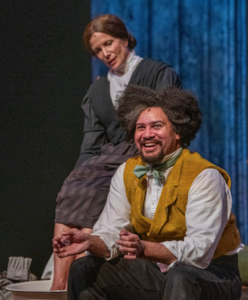Photos by Luis Escobar, Reflections Photography Studio
It’s a time of great agitation. Political parties are at each other’s throats. Women are up in arms about their longed-for rights. People of color are trying to be recognized as just as worthy of the American dream as anyone else.
 No, it’s not the lead-up to the most significant election of the 21st century. It’s not even the civil rights era of the 20th century. It’s the middle of the 19th century—1849 to 1895 to be exact—and one story of the still-not-resolved struggle for racial and gender equality has been distilled into a two-hour riveting dialogue between two icons of that era.
No, it’s not the lead-up to the most significant election of the 21st century. It’s not even the civil rights era of the 20th century. It’s the middle of the 19th century—1849 to 1895 to be exact—and one story of the still-not-resolved struggle for racial and gender equality has been distilled into a two-hour riveting dialogue between two icons of that era.
The Agitators, a powerful and engrossing two-person two-act play by Mat Smith, opened at PCPA in Santa Maria August 22, and unfortunately has only 11 more performances in the queue (only three this weekend at the Marian Theatre and eight more at the Solvang Festival Theater August 29-September 8).
 Director Mark Booher has successfully staged a series of weighty yet very human conversations between two “titans of American history”—nomenclature he helps his performers capture while also giving them the reins to explore the intense passion, exhaustion, companionship, and even levity that comes with a true meeting of two minds.
Director Mark Booher has successfully staged a series of weighty yet very human conversations between two “titans of American history”—nomenclature he helps his performers capture while also giving them the reins to explore the intense passion, exhaustion, companionship, and even levity that comes with a true meeting of two minds.
And what minds! Abolitionist Frederick Douglass and women’s rights activist Susan B. Anthony are warmly and wonderfully played by Cordell Cole, soft-spoken yet vehement, and Polly Firestone Walker, who underneath a dour, self-effacing demeanor evidences a playful and fierce resolve. They are well-matched to carry the weight of the play’s words while bringing their sometimes contentious, sometimes humorous, always engaging relationship to life.
The creative team has worked wonders in managing to place the players in a several different settings spanning almost 50 years. Jason Bolen’s set design, Amber Whatley’s lighting, Nat Houle’s sound design, and Skyla Robison’s costumes are ingenious, taking us from the glowing remains of a house fire to a train station, from Anthony’s simple Quaker-inspired white blouse and long straight skirt to the suggestion of a late 1880s corset and bustle, from the sounds of Douglass family violins to fierce rainstorms and angry mobs.
Along the way we are reminded, in huge and historical as well as small and personal terms, of what has come before us, as the struggle for equality continues. If that sounds pretentious, or overwhelming, or just too heavy a burden to take on, please don’t let that stand in the way of experiencing an excellent show that burns bright now but will be gone in the blink of an eye.
